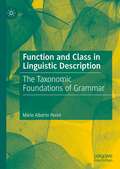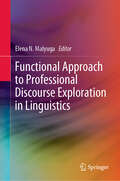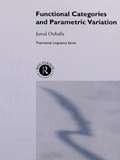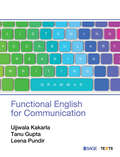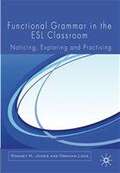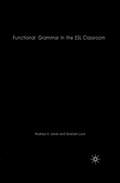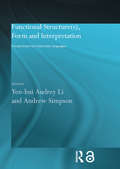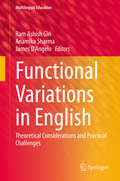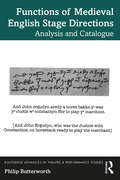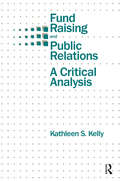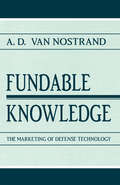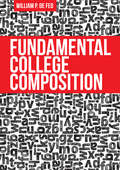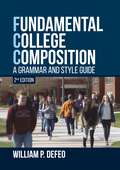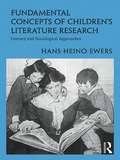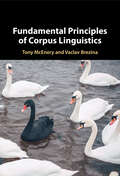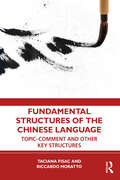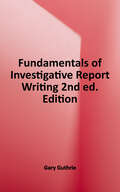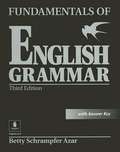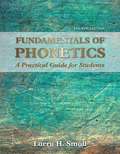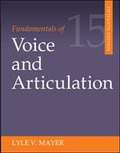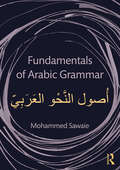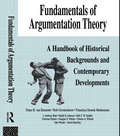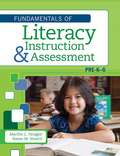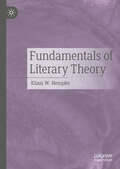- Table View
- List View
Function and Class in Linguistic Description: The Taxonomic Foundations of Grammar
by Mário Alberto PeriniThis book deals with the traditional problem of the classification of linguistic units, with a primary focus on word classes. The approach is descriptive rather than theoretical, and is based on the use of distinctive features analogous to the ones used in phonology, which entails a radical reworking of the traditional classification. The first part presents some basic notions such as the use of distinctive features and the role of word classes in grammar; classification by prototypes; and the use of world knowledge as a resource to assign thematic relations to constituents in the sentence. In the second part, some descriptive problems are examined, namely the classification of verbs according to valency; connectives, adverbs, and the internal constituents of the NP; and the classification of units larger than words. This book will be of use as a guide for linguists working on the description of natural languages, as well as a resource for students on courses in linguistic theory and description.
Functional Approach to Professional Discourse Exploration in Linguistics
by Elena N. MalyugaThis book presents research into various types of professional discourse through the prism of the functional linguistics approach. Focusing mainly on practical aspects of speech, the book discusses various topics, such as structural, semantic, cognitive and pragmatic characteristics of professional discourse, argumentation strategies, humour in professional discourse, and word-building processes. It also highlights communicative effectiveness methods in professional discourse. Offering new ideas and discussing the latest findings, the book is intended for researchers, lecturers and professionals in the field.
Functional Categories and Parametric Variation
by Jamal OuhallaThis book explores the idea that functional categories are the flesh and blood of grammar'. From within the context of the Principles and Parameters framework put forward by Chomsky and others, Jamal Ouhalla develops the argument that much of what we understand by the term grammar and grammatical variation involves functional categories in a crucial way. His main thesis is that most, if not all, of the information which determines the major grammatical processes and relations (movement, agreement, case, etc.) and consequently parametric (or crosslinguistic) variation is associated with functional categories. By identifying parameters with a limited set of lexical properties associated with a well-defined group of functional categories, the book offers a new and highly constrained version of the theory of Lexical Parametrization. Dr Ouhalla begins by identifying a set of lexical properties which distinguish functional categories from substantives, arguing that each of them represents a parameter in its own right. He then goes on to argue on the basis of evidence drawn from a broad range of languages that functional categories, most of which are bound morphemes, behave in important respects like independent syntactic categories, and therefore should be assigned a full categorial status on a par with substantives. The remainder of the book contains detailed discussions of how this conclusion, together with the theory of Lexical Parametrization developed, account naturally for some major typological differences having to do mainly with word order in sentences and noun phrases. Although the various discussions it contains are conducted within the Chomskyan framework, Functional Categories and Parametric Variation is comprehensible to linguists of all theoretical persuasions. It is an original and important contribution to syntactic theory in general.
Functional English for Communication
by Ujjwala Kakarla Tanu GuptaA lucid, comprehensive yet compact text focusing on core language skills in English including vocabulary building, lexis, syntax, and communicative grammar. Functional English for Communication will help readers enrich their listening, speaking, reading and writing skills through a large number of practice exercises and examples from academic and professional areas. The modules of the book have been specially designed to help readers use English language with clarity and confidence, thereby enhancing their communication skills and employability. The book exhibits the appropriate use of grammar and syntax, and the methods of identifying and avoiding common errors. Key Features • Encourages readers to think critically and use English effectively in academic, social and professional contexts • Aims at improving professional communication and employability skills of students • Aids self-learning in a creative and competent manner through a wide range of practice exercises and activities • Provides carefully designed units to familiarize students with the test patterns of various competitive examinations such as CAT, TOEFL, GMAT, IELTS, TEFL
Functional Grammar in the ESL Classroom
by Rodney H. JonesThe book introduces six general procedures for teaching grammar to learners of English as a second language. The procedures are designed to encourage learners to notice, explore and practice grammar in context. Each description and discussion of a procedure is followed by two sample lesson plans together with sample texts and worksheets. Teachers can either use these 'as is' or adapt them for their own students. The lessons are suitable for a wide range of students from beginning learners to advanced learners. A final chapter provides examples of lessons in which several procedures are combined. In addition, before each sample lesson plan, the grammar focus of the lesson is briefly explained for the teacher. These procedures all illustrate how grammar can be taught through texts, and they are based on an understanding of the latest research on pedagogical grammar and the role of language awareness and discovery in second language learning and provide teachers with principles they can apply in developing their own teaching materials and activities. The grammar explanations preceding each teaching plan provide a fresh look at English grammar drawing on work in systemic functional linguistics.
Functional Grammar in the ESL Classroom: Noticing, Exploring and Practicing
by R. Jones G. LockA set of easy to use techniques helps students discover for themselves how grammar works in real world contexts and how grammatical choices are not just about form but about meaning. Sample teaching ideas, covering a wide range of grammatical topics including verb tense, voice, reference and the organization of texts, accompanies each procedure.
Functional Structure: Perspectives from East Asian Languages (Routledge Studies in Asian Linguistics)
by Andrew Simpson Yen-hui Audrey LiThe issue of how interpretation results from the form and type of syntactic structures present in language is one which is central and hotly debated in both theoretical and descriptive linguistics.This volume brings together a series of eleven new cutting-edge essays by leading experts in East Asian languages which shows how the study of formal structures and functional morphemes in Chinese, Japanese and Korean adds much to our general understanding of the close connections between form and interpretation. This specially commissioned collection will be of interest to linguists of all backgrounds working in the general area of syntax and language change, as well as those with a special interest in Chinese, Japanese and Korean.
Functional Variations in English: Theoretical Considerations and Practical Challenges (Multilingual Education #37)
by Ram Ashish Giri Anamika Sharma James D’AngeloThis volume is a compilation of 21 distinguished chapters, an Introduction, and an Afterword with a thematic focus on the functional variations of English in non-native contexts. Highly acclaimed scholars in the field of (applied) linguistics, bringing their expertise from the core areas of general linguistics, sociolinguistics, psycholinguistics, cognitive linguistics, educational linguistics, and stylistics, address the ways in which English language varies in different contexts. The contributions carefully examine the variations, the complexities and the concerns arising thereof, and explore the resultant pedagogical implications. The volume, in this respect, contributes to an informed process for policy decisions, curriculum design, material development, and most importantly classroom practices based on the ability, feasibility and desirability of English for the users, as a step towards nurturing globally-minded, globally-competent, and globally-functioning individuals.Taking the deliberations through and beyond Kachru’s world Englishes model of three circles, this book is an attempt to: See what the users of English ‘do’ or ‘do not do’ with the language, rather than ‘where’ they come fromCreate a flexible mindset to enable acceptance and respect for linguistic variations in English usagePromote practical abilities for language and ‘communication management’Facilitate informed pedagogical practices based on global realities
Functions of Medieval English Stage Directions: Analysis and Catalogue (Routledge Advances in Theatre & Performance Studies)
by Philip ButterworthWhen we speak of theatre, we think we know what a stage direction is: we tend to think of it as an authorial requirement, devised to be complementary to the spoken text and directed at those who put on a play as to what, when, where, how or why a moment, action or its staging should be completed. This is the general understanding to condition a theatrical convention known as the 'stage direction'. As such, we recognise that the stage direction is directed towards actors, directors, designers, and any others who have a part to play in the practical realisation of the play. And perhaps we think that this has always been the case. However, the term 'stage direction' is not a medieval one, nor does an English medieval equivalent term exist to codify the functions contained in extraneous manuscript notes, requirements, directions or records. The medieval English stage direction does not generally function in this way: it mainly exists as an observed record of earlier performance. There are examples of other functions, but even they are not directed at players or those involved in creating performance. More than 2000 stage directions from 40 or so plays and cycles have been included in the catalogue of the volume, and over 400 of those have been selected for analysis throughout the work. The purpose of this research is to examine the theatrical functions of medieval English stage directions as records of earlier performance. Examples of such functions are largely taken from outdoor scriptural plays. This book will be of great interest to students and scholars in theatre, medieval history and literature.
Fund Raising and Public Relations: A Critical Analysis (Routledge Communication Ser.)
by Kathleen S. KellyThis is the first scholarly work to place the function of fund raising within the field of public relations, redefining it as a specialization responsible for the management of communication between a charitable organization and its donor publics. Combining her academic interest in communication with her experience as a fund raiser, the author has produced one of the few critical studies on fund raising, challenging current perspectives and employing systems theory and the concept of organizational autonomy to lead to a new and different approach. Until now, fund raising has been an anomaly, without an academic home and with few general theories to guide practitioner behavior. This book theoretically grounds fund raising and develops a theory that provides a fuller understanding of one of the fastest growing occupations in the nonprofit sector.
Fundable Knowledge: The Marketing of Defense Technology (Rhetoric, Knowledge, and Society Series)
by A.D. Van NostrandKnowledge is the basic output of the defense technology establishment in the United States; it is what enables the development of weapon systems. From this premise, this volume explores the process of knowledge production in defense technology from the beginnings of the Cold War to the present time. Produced through the process of research and development (R&D), technical knowledge for defense is an economic commodity. It is "fundable" in the sense of having future value. Like other commodities in the futures market, it is purchased before it is produced. But unlike those other commodities, this knowledge is typically produced through the joint efforts of the customer and the vendor. This study highlights two polar aspects of knowledge production: technology development and technology transfer. It centers on the present, shifting concept of defense conversion that is redefining defense technology policy. The book also includes cited documents pertaining to the transactions that engage customers and vendors in the process of knowledge production. The documents constitute a literature of needs and claims, and they reveal two chief properties: problem formulation and tactical positioning. Apart from the substantive yield of these particular documents, the strategy of evidence in this volume has broad implications for further study, suggesting a means of analyzing knowledge production in other large social systems.
Fundamental College Composition
by William P. DeFeoFundamentals of College Composition (FCC) is a compact, college level writing text that presents the underlying grammatical structures of Standard American English in a format that is understandable without prior formal grammar training. The book’s purpose is to improve the clarity and precision of undergraduate writing. College instructors know that far too many undergraduates write poorly. University English departments teach literature, not fundamental writing; university writing departments teach higher level creative-commercial writing, not fundamental writing. Other disciplines must focus on teaching course content, and have precious little time to devote to improving their undergraduate’s composition skills.°A popular reaction to the undergraduate writing dilemma has been to institute discipline-specific writing classes. These classes tailor writing assignments to their particular disciplines, and a wide array of specialized writing texts are being published to meet the needs of these specialty writing courses. Often, Strunk and White's Elements of Style (ES) is used as a companion to these texts. ES is an excellent volume, but it was written in 1908 for a classification of students who possessed solid foundations in formal grammar studies. Twenty first century undergraduates no longer possess those foundations and a text that presumes they do fails despite its distinguished and noble history. FCC is designed to address this "grammatical gap." It provides a sub-structure of grammar study sufficient to bring a modern student to a basic understanding of the foundations of compositional language arts. It confronts struggling writers with their compositional shortcomings, presents them with a kit of fundamental grammatical tools, explains the tools' purposes and functions, and invites students to write, revise, and re-write in short bursts of directed prose. It avoids every intricacy of grammatical science that does not apply directly and practically to the production of clear, concise sentences and structured paragraphs.°Good writing requires labor. FCC imposes the burden of good writing equally on student and instructor. Writing, revising and re-writing are obligations placed squarely on the student, but they are of little consequence without the pointed, deliberate, and supportive correction of the instructor. FCC coordinates these student-instructor efforts and provides a base of writing information and a spectrum of writing activities that will build tangible writing skills.
Fundamental College Composition: A Grammar and Style Guide
by William Paul DeFeoThis second edition of Fundamental College Composition: A Grammar and Style Guide (FCC: AGSG), contains nine new chapters designed to further assist college students in their journey to become clear and precise writers of English. College classroo
Fundamental Concepts of Children's Literature Research: Literary and Sociological Approaches (Children's Literature and Culture #Vol. 62)
by Hans-Heino EwersIn this book, Ewers provides students and professors with a new system of categorization for a differentiated description of children’s literature. In the early 1970s, Swedish children’s literature scholar Göte Kingberg worked to establish a system of scientific terminology for international use, but these terms are now somewhat antiquated. This book offers a much-needed update, systematically analyzing the field and articulating its key definitions, terms, and concepts. International in scope, this study touches on subjects including the distribution of primers and textbooks, the means by which children’s books are evaluated and classified, and the ways in which children’s literature can find an adult audience. Also discussed are the system of symbols, norms, concepts, and discourses that have evolved during the past two centuries, leading to an investigation of how authors and publishers have endeavored to make literature "appropriate" for children and of what it means to accommodate children’s needs, wishes, and values. Throughout, Ewers provides concrete examples and clear definitions of terms so that any scholar interested in children’s literature will find this book approachable, insightful, and one that crosses cultural boundaries.
Fundamental Principles of Corpus Linguistics
by Tony McEnery Vaclav BrezinaHow might evidence of language use – writing and speech – be used as a way of studying language? Corpus linguistics is the study of linguistic data from a particular language or set of languages. It is a fast-moving approach to studying language, and there is still a degree of divergence in how research questions are approached using corpus data. This book uses a framework, based on the work of Karl Popper, to explore a number of fundamental issues in corpus linguistics. It critically evaluates how these issues are tackled, and proposes a set of best practices for future research. It spells out why using corpus data is valuable, what we can learn from using it, and how we may most effectively progress our understanding of language by using such data. It is essential reading for researchers and students of language in general, and of applied linguistics and English language in particular.
Fundamental Structures of the Chinese Language: Topic-Comment and Other Key Structures
by Taciana Fisac Riccardo MorattoFundamental Structures of the Chinese Language is an exceptional resource for understanding how Chinese grammar functions in natural discourse.This book departs from the conventional approach of superimposing grammatical constructs from English onto Chinese and focuses on the topic–comment structure inherent in the Chinese language. Constructions that are usually considered complex or challenging for students whose mother tongues are subject–verb–object languages will be more easily understandable with this analysis. Simple and complex verbal structures are discussed in depth with the incorporation of the aspect category, which provides an enormous richness of nuances in the internal development of the action, and word order is considered one of the key features of the Chinese language. All the explanations are applied to numerous examples of real Chinese texts.This textbook is a valuable resource for students, teachers, and researchers in Chinese language courses including Chinese translation, Chinese linguistics, and comparison linguistics in general.
Fundamentals 0f Investigative Report Writing
by Gary GuthrieThis book teaches readers how to precisely construct investigative reports, whether for criminal, employment-policy, or employee-performance investigations. <p><p>Dedicated to helping report-writers produce valuable extrinsic documentation, the book explains how to describe "what happened and why" in clear, concise terms. Topics include writing attitude and ethics, the "always" rules of writing, tips for conducting successful interviews, techniques for writing with precision, purposes and techniques for editing and proof-reading, and how to incorporate sketches, drawings, diagrams, and other visuals. The book also addresses considerations when writing United States Constitutional- based reports, as well as strategies involved in other forms of written communication such as e-mail, business letters, memoranda, and social media. <p><p>This edition features a chapter devoted to performance evaluations that helps supervisors to be accurate, state things efficiently, insure the quality of the organization, and develop the employee. Each chapter includes learning objectives, chapter summaries, specific writing assignments, and a feature story related to the chapter's content-focus. Illustrations have been carefully selected to support the written text. <p><p>Thoughtfully developed to set students and instructors up for success, Fundamentals of Investigative Report Writing is ideal for technical education programs in administration of justice, criminal justice, and law enforcement and courses on investigative and police report writing and report writing for criminal justice and law enforcement professionals.
Fundamentals Of English Grammar (Azar Grammar Series)
by Betty Schrampfer AzarThe Fundamentals of English Grammar Workbook consists of self-study exercises for independent work. A classic developmental skills text for lower-intermediate and intermediate English language learners, Fundamentals of English Grammar is a comprehensive grammar as well as a stimulating and teachable classroom text.
Fundamentals Of Phonetics: A Practical Guide For Students
by Larry H. SmallHere is a clear, systematic introduction to the fundamentals of linguistic phonetics with a total learning package designed to help students become proficient in phonetics and phonetic transcription. <P><P>Fundamentals of Phonetics by Larry Small provides speech and hearing students with a good understanding of phonetics principles through practice. The text uses in-text exercises and supplemental audio recordings to teach the practical skills necessary to successfully perform phonetic transcription of individuals using the International Phonetic Alphabet (IPA). <P><P>Students learn about the transcription of consonants and vowels, connected speech, and individuals with speech sound disorders. A chapter on speech acoustics introduces spectrograms and the acoustic characteristics of speech sounds. Students also learn how to transcribe individuals who display regional and ethnic dialectal variation of speech, including those who have learned to speak English as a second language. <P><P>Throughout the text are included chapter objectives, learning exercises, in-class and take-home assignments, online resources, and study questions that will help students learn, process, and practice the material presented in the text.
Fundamentals Of Voice And Articulation
by Lyle MayerFor more than fifty years, Fundamentals of Voice and Articulation has helped students develop effective voice and speech habits with its amusing exercises and lively practice material.
Fundamentals of Arabic Grammar
by Mohammed SawaieFundamentals of Arabic Grammar provides an authoritative guide to Modern Standard Arabic (MSA) grammar. It has been organised to promote a thorough understanding of MSA grammar and presents its complexities in a cohesive and user-friendly format, filling many gaps left by other textbooks. Explanations are clear, full and accessible and extensive cross-referencing, two generous indices and six appendices provide users with easy access to the information they require. No prior knowledge of linguistic terminology is required. Features include: Expert treatment of a full range of grammar topics and structures, including the case system, Idhaafa, the equational sentence, quantifiers and the vocative, generously spread across thirty eight chapters Special attention to parts of speech, such as nouns, pronouns, adjectives, adverbs and propositions, given at the beginning of the book to acquaint students with the basic units of Arabic and provide a solid foundation for further learning A wide range of contemporary examples drawn from real life to provide solid context to grammar points, further supported by word glosses and idiomatic translations of sentences Grammatical terms given in both Arabic and English A wide variety of supplementary learning resources such as practice sheets, exercises and verb tables available for free download at http://www.routledge.com/books/details/9780415710046/ Substantial bibliography incorporating primary Arabic grammar sources in addition to secondary sources in Arabic and in English Fundamentals of Arabic Grammar has been field tested over a number of years and has been written by a highly experienced teacher of Arabic. It will be an essential resource for students and teachers of Arabic at all university levels and is suitable for use both as a companion reference text in Arabic language courses and as a standalone text in independent grammar classes.
Fundamentals of Argumentation Theory: A Handbook of Historical Backgrounds and Contemporary Developments
by Frans H. van Eemeren Rob Grootendorst Ralph H. Johnson Christian Plantin Charles A. WillardArgumentation theory is a distinctly multidisciplinary field of inquiry. It draws its data, assumptions, and methods from disciplines as disparate as formal logic and discourse analysis, linguistics and forensic science, philosophy and psychology, political science and education, sociology and law, and rhetoric and artificial intelligence. This presents the growing group of interested scholars and students with a problem of access, since it is even for those active in the field not common to have acquired a familiarity with relevant aspects of each discipline that enters into this multidisciplinary matrix. This book offers its readers a unique comprehensive survey of the various theoretical contributions which have been made to the study of argumentation. It discusses the historical works that provide the background to the field and all major approaches and trends in contemporary research. Argument has been the subject of systematic inquiry for twenty-five hundred years. It has been graced with theories, such as formal logic or the legal theory of evidence, that have acquired a more or less settled provenance with regard to specific issues. But there has been nothing to date that qualifies as a unified general theory of argumentation, in all its richness and complexity. This being so, the argumentation theorist must have access to materials and methods that lie beyond his or her "home" subject. It is precisely on this account that this volume is offered to all the constituent research communities and their students. Apart from the historical sections, each chapter provides an economical introduction to the problems and methods that characterize a given part of the contemporary research program. Because the chapters are self-contained, they can be consulted in the order of a reader's interests or research requirements. But there is value in reading the work in its entirety. Jointly authored by the very people whose research has done much to define the current state of argumentation theory and to point the way toward more general and unified future treatments, this book is an impressively authoritative contribution to the field.
Fundamentals of Critical Argumentation
by Douglas WaltonPresenting the basic tools for the identification, analysis, and evaluation of common arguments for beginners, this book informs by using examples of arguments in dialogues, both in the text itself and in the exercises. (Examples of controversial legal, political, and ethical arguments are analyzed. ) Illustrating the most common kinds of arguments, the book also explains how to evaluate each kind by critical questioning. Douglas Walton demonstrates the reasonable nature of arguments under the right dialogue conditions by using critical questions to evaluate them.
Fundamentals of Literacy Instruction and Assessment, Pre-K-6
by Martha C. Hougen Susan M. SmarttHougen (College and Career Readiness Initiative: English/Language Arts Faculty Collaborative, U. of Texas-Austin) and Smartt (National Comprehensive Center for Teacher Quality, Vanderbilt U. ) compile 17 chapters by education scholars and researchers from the US who introduce pre-service teachers and parents to teaching fundamental literacy skills in students in pre-K through sixth grade. Chapters are organized by the main components of reading instruction and the typical development of skills, from phonological awareness to fluency to writing, and include recommended assessment practices, in addition to chapters on literacy in the disciplines and current laws, policies, initiatives, and response to intervention. They end with chapters on putting it all together and tips for becoming an effective teacher. They refer to the most recent standards, including Common Core State Standards, the International Reading Association Standards for Reading Professionals, and The International Dyslexia Association Knowledge and Practice Standards for Teachers of Reading. Annotation ©2012 Book News, Inc. , Portland, OR (booknews. com)
Fundamentals of Literary Theory
by Klaus W. HempferThis monograph offers new insights into the fundamentals of literary theory. It synthesizes and evaluates research from recent decades, critically examining this work from a transnational perspective and with a particular focus on publications in English, French and German. The book is divided into six sub-theories that tackle problems of interpretation, fictionality, performativity and performance, intertextuality, genre and periodization. Drawing on texts from Classical Antiquity to English, German, French, Spanish and Italian literature, the book brings together a range of different scholarly traditions in different languages.
